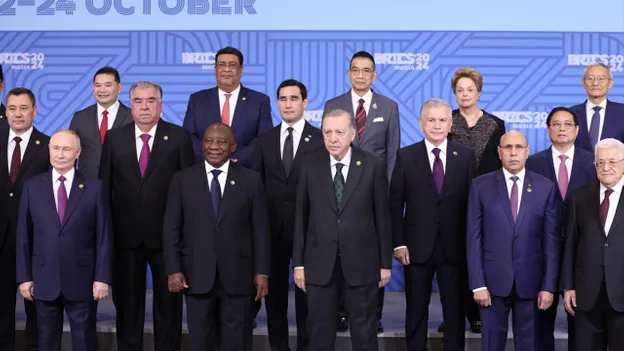Ahead of the 16th BRICS summit, Turkish President Recep Tayyip Erdoğan submitted a request for Turkey’s associate membership in the group. However, by the end of the summit, no statements were made regarding the issue.
🇮🇳🇹🇷🇵🇰 India has blocked Turkiye's entry into BRICS. The reason is Ankara's good relations with Pakistan, – Bild pic.twitter.com/pFMHxibZxZ
— MAKS 24 🇺🇦👀 (@Maks_NAFO_FELLA) October 24, 2024
Sinan Ülgen, a Turkish foreign policy expert at the U.S.-based Carnegie Endowment for International Peace, claimed there was no formal vote on the matter. Ülgen, a former Turkish diplomat, suggested that Turkey’s entry into BRICS is being blocked by India due to Ankara’s strong relations with Pakistan, a country with longstanding tensions with New Delhi.
Read more: BRICS reject ‘illegal’ Western sanctions
Ülgen noted that Erdoğan has multiple reasons for pursuing BRICS membership, mainly to bolster Turkey’s ‘strategic autonomy’ through this alliance. Additionally, Turkey might be signaling frustration with the European Union over delays in its EU membership bid and the modernization of the EU-Turkey customs union.
Political prestige is also a factor, according to the expert, as Erdoğan seeks to show he can engage with both NATO and BRICS. However, critics argue that these moves are isolating Turkey on the global stage, despite Erdoğan’s efforts to portray himself as an ‘international mediator.’ Turkey’s application has also raised concerns among its Western allies, particularly within NATO.
Read more: BRICS Summit: A Growing Challenge to Western Dominance in a Multipolar World
Ülgen mentioned that further BRICS expansion is unlikely in the near future, as several countries oppose adding new members. Recently, BRICS accepted new members, including Iran, Egypt, Ethiopia, the UAE, and Saudi Arabia, while official membership applications have also been submitted by Turkey, Azerbaijan, and Malaysia.














